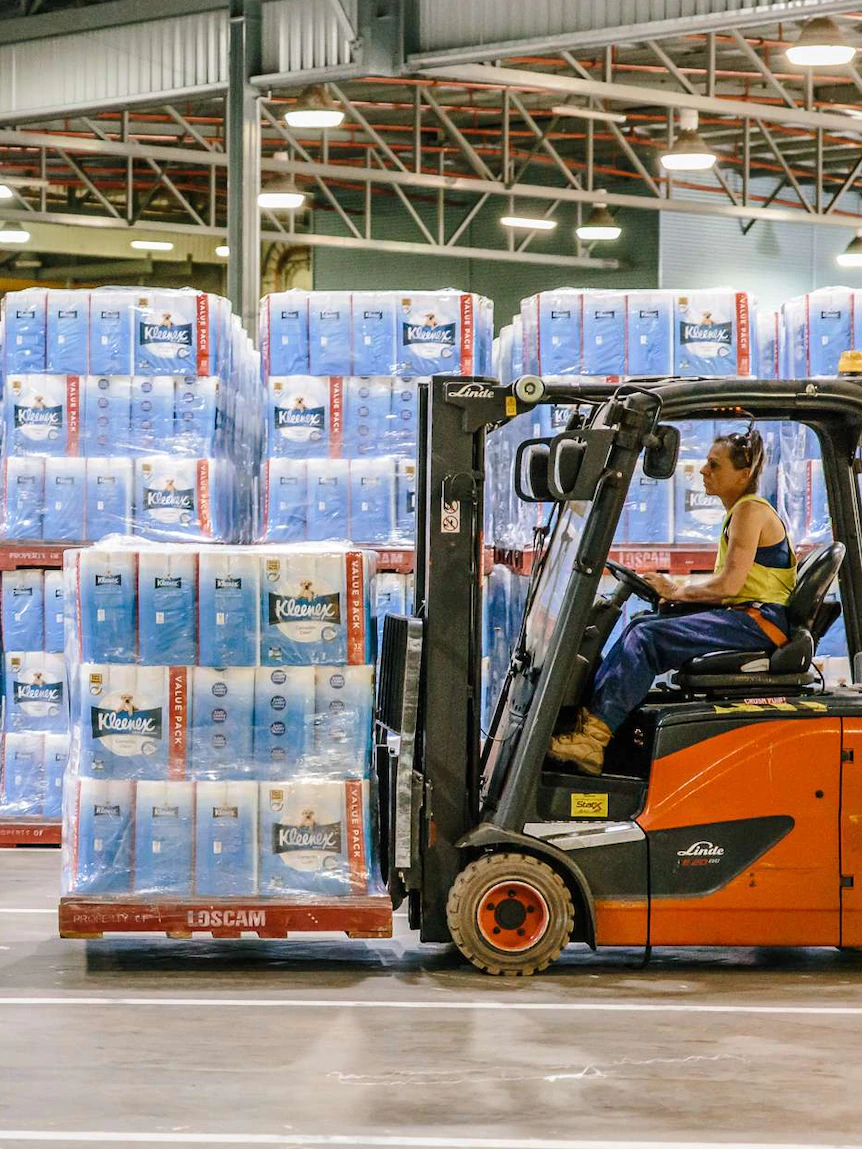Global supply chain disruptions are helping lift demand for Australian-made toilet paper and tissues products, according to one of the country’s largest manufacturers.
Key points:
- Kimberly-Clark Australia says supply chain disruptions are resulting in higher demand for its products
- The Millicent mill manager says there is about a 10 per cent increase in demand compared to pre-pandemic levels
- The manufacturing union says supply disruptions prove that Australia needs to boost its domestic processing capacity
Kimberly-Clark Australia has reported an approximate 10 per cent increase in demand compared to pre-pandemic levels.
Adam Carpenter, mill manager at the company’s operation in Millicent, South Australia said raw material availability was playing a significant role in demand for their products.
“We, being a local manufacturer in Australia, have been able to supply products when other suppliers potentially have been importing products, so they’ve been more heavily impacted by the global supply chain issues,” Mr Carpenter said.
He said the company had been looking at ways to better ensure security of supply since 2020.
He said both domestic and international issues had contributed to supply chain challenges.
“We have also been challenged with road transport, so with trucks and truck availability,” he said.
“Also pallet availability, which was a bit of an issue over the over the Christmas period and early in this year, have definitely impacted us and others.
“That is ultimately impacting the product on the shelves.”
Panic-buying peak
Mr Carpenter said 2022 had been “a very busy year so far”.
“Demand has been particularly strong,” he said.
“[Demand] is not as extreme as it was in 2020, when that panic buying did start.
“It was quite unusual in the sense that we pretty well just emptied our warehouses in an attempt to continue to keep product on the shelves.
Mr Carpenter said “demand is probably up about 10 per cent” from before 2020.
“Twenty-twenty was very much a peak over quite a short period of time.
“It was very concentrated over about a six-to-eight-week period.
“This year, so far, we have seen a more sustained demand, which equates to probably 10 per cent above what we normally see.
“We’re shipping in the order of 15,000 pallets a week out of the south-east [of South Australia], so it is very busy.”
Call for more domestic capacity
Mr Carpenter’s words were echoed by the manufacturing union.
Manufacturing national secretary with the CFMMEU Michael O’Connor said there were a “whole range of issues” impacting the sector, inclduing the behaviour of
“The issue of supply chain disruption – whether that be due to behaviour of the Chinese government, whether it’s due to shortage of ships, or due to a shortage of shipping containers, it’s due to a whole range of issues,” he said.
“I think all the supply chain disruptions because of COVID, geopolitical events, Russian invasion of Ukraine, et cetera, it all keeps reinforcing the fact that as much as possible, this country should be self-sufficient.
“We should be making and manufacturing more of that here,” Mr O’Connor said.
He said it was vital for Australia to become more self-sufficient.
“We want to make sure that we can be a lot more robust, a lot more self-sufficient, and there is a pathway to do that.
“Whether it’s paper products, tissue products, packaging, timber, people can’t get their houses built on time.
“People can’t get their houses renovated. People can’t get enough packaging material, because of the supply chain disruption.
“We need to address those issues.”
Mr O’Connor said the sector was hopeful a new federal Labor government would help resolve some of the issues.
“Australia needs more pulp capacity … we should be manufacturing more pulp, which can then, of course, support our paper machines throughout Australia.
“We hope that this government will do more to address the timber industry shortage, more to see the expansion of our forests estate, and also it has made a commitment of millions of dollars to try and increase the availability of training to upskill our workforce in this sector.”
Posted , updated




